Information Management and Decision Making at Dubai Holding
VerifiedAdded on 2023/01/12
|13
|4177
|34
Report
AI Summary
This report analyzes information management and decision-making processes, focusing on the Dubai Holding Group. It identifies critical features of data and information, determining criteria for selecting appropriate data to support strategic decisions. The report evaluates the impact of a management information system on the company, examining legal responsibilities in sourcing, sharing, and storing information. It discusses various information types, access methods, and formats, along with their impacts. Furthermore, the report critically analyzes information for identifying patterns and trends, evaluates decision-making tools, and determines available data sources. Finally, it identifies methods for evaluating management information and developing information capture to inform and support strategic decision-making. The report covers various aspects of data, legalities, decision-making tools, and business strategies.
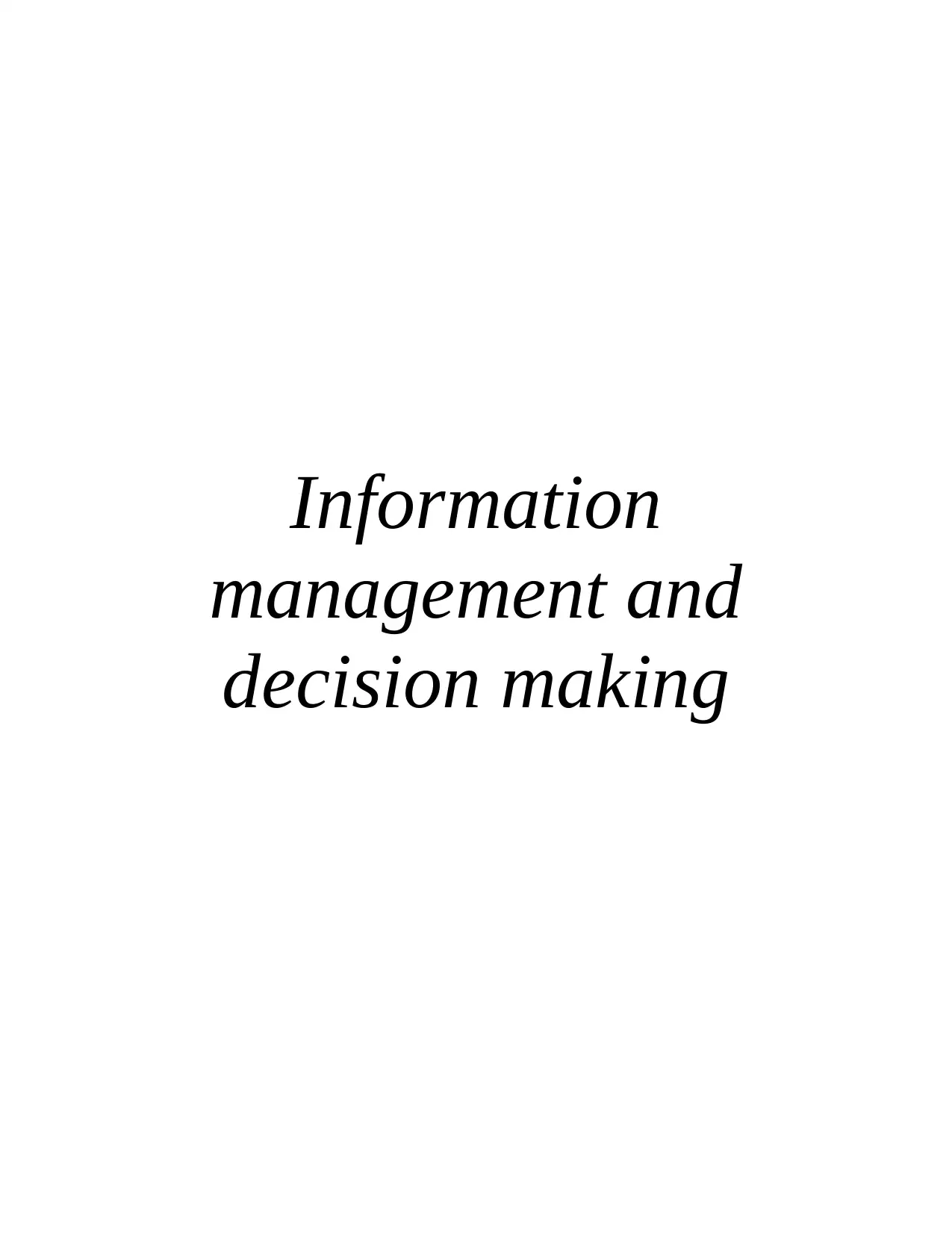
Information
management and
decision making
management and
decision making
Paraphrase This Document
Need a fresh take? Get an instant paraphrase of this document with our AI Paraphraser
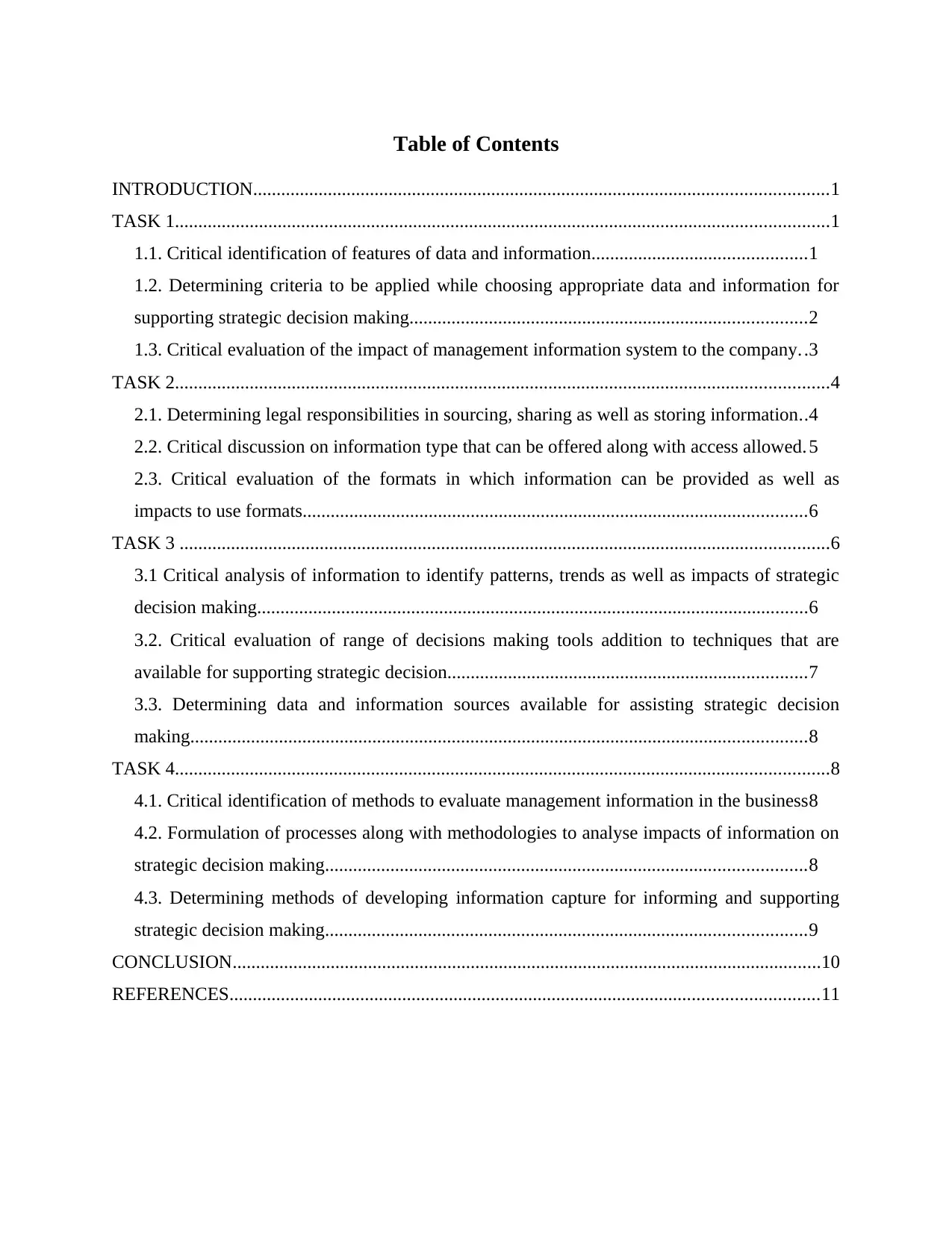
Table of Contents
INTRODUCTION...........................................................................................................................1
TASK 1............................................................................................................................................1
1.1. Critical identification of features of data and information..............................................1
1.2. Determining criteria to be applied while choosing appropriate data and information for
supporting strategic decision making.....................................................................................2
1.3. Critical evaluation of the impact of management information system to the company..3
TASK 2............................................................................................................................................4
2.1. Determining legal responsibilities in sourcing, sharing as well as storing information..4
2.2. Critical discussion on information type that can be offered along with access allowed. 5
2.3. Critical evaluation of the formats in which information can be provided as well as
impacts to use formats............................................................................................................6
TASK 3 ...........................................................................................................................................6
3.1 Critical analysis of information to identify patterns, trends as well as impacts of strategic
decision making......................................................................................................................6
3.2. Critical evaluation of range of decisions making tools addition to techniques that are
available for supporting strategic decision.............................................................................7
3.3. Determining data and information sources available for assisting strategic decision
making....................................................................................................................................8
TASK 4............................................................................................................................................8
4.1. Critical identification of methods to evaluate management information in the business8
4.2. Formulation of processes along with methodologies to analyse impacts of information on
strategic decision making.......................................................................................................8
4.3. Determining methods of developing information capture for informing and supporting
strategic decision making.......................................................................................................9
CONCLUSION..............................................................................................................................10
REFERENCES..............................................................................................................................11
INTRODUCTION...........................................................................................................................1
TASK 1............................................................................................................................................1
1.1. Critical identification of features of data and information..............................................1
1.2. Determining criteria to be applied while choosing appropriate data and information for
supporting strategic decision making.....................................................................................2
1.3. Critical evaluation of the impact of management information system to the company..3
TASK 2............................................................................................................................................4
2.1. Determining legal responsibilities in sourcing, sharing as well as storing information..4
2.2. Critical discussion on information type that can be offered along with access allowed. 5
2.3. Critical evaluation of the formats in which information can be provided as well as
impacts to use formats............................................................................................................6
TASK 3 ...........................................................................................................................................6
3.1 Critical analysis of information to identify patterns, trends as well as impacts of strategic
decision making......................................................................................................................6
3.2. Critical evaluation of range of decisions making tools addition to techniques that are
available for supporting strategic decision.............................................................................7
3.3. Determining data and information sources available for assisting strategic decision
making....................................................................................................................................8
TASK 4............................................................................................................................................8
4.1. Critical identification of methods to evaluate management information in the business8
4.2. Formulation of processes along with methodologies to analyse impacts of information on
strategic decision making.......................................................................................................8
4.3. Determining methods of developing information capture for informing and supporting
strategic decision making.......................................................................................................9
CONCLUSION..............................................................................................................................10
REFERENCES..............................................................................................................................11
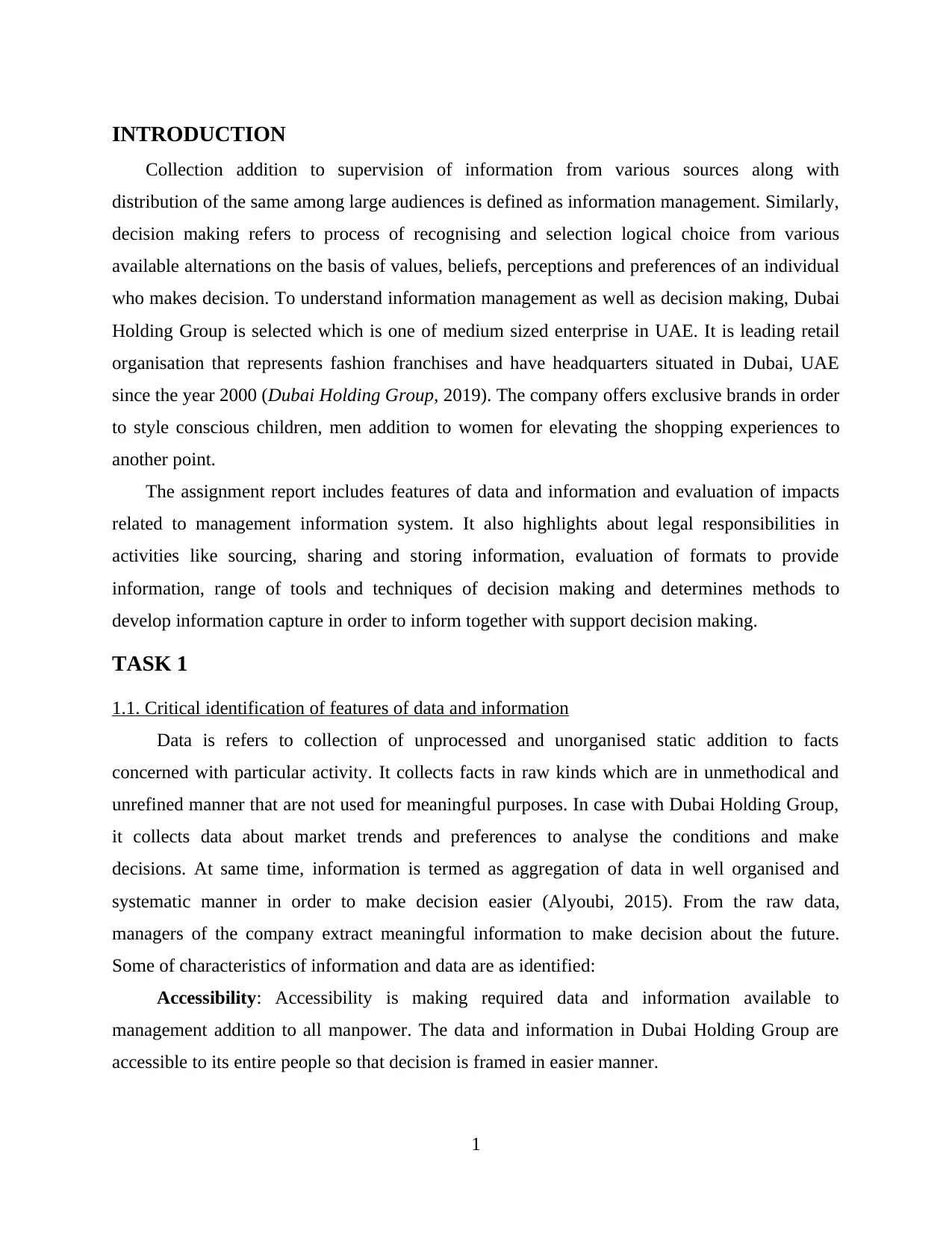
INTRODUCTION
Collection addition to supervision of information from various sources along with
distribution of the same among large audiences is defined as information management. Similarly,
decision making refers to process of recognising and selection logical choice from various
available alternations on the basis of values, beliefs, perceptions and preferences of an individual
who makes decision. To understand information management as well as decision making, Dubai
Holding Group is selected which is one of medium sized enterprise in UAE. It is leading retail
organisation that represents fashion franchises and have headquarters situated in Dubai, UAE
since the year 2000 (Dubai Holding Group, 2019). The company offers exclusive brands in order
to style conscious children, men addition to women for elevating the shopping experiences to
another point.
The assignment report includes features of data and information and evaluation of impacts
related to management information system. It also highlights about legal responsibilities in
activities like sourcing, sharing and storing information, evaluation of formats to provide
information, range of tools and techniques of decision making and determines methods to
develop information capture in order to inform together with support decision making.
TASK 1
1.1. Critical identification of features of data and information
Data is refers to collection of unprocessed and unorganised static addition to facts
concerned with particular activity. It collects facts in raw kinds which are in unmethodical and
unrefined manner that are not used for meaningful purposes. In case with Dubai Holding Group,
it collects data about market trends and preferences to analyse the conditions and make
decisions. At same time, information is termed as aggregation of data in well organised and
systematic manner in order to make decision easier (Alyoubi, 2015). From the raw data,
managers of the company extract meaningful information to make decision about the future.
Some of characteristics of information and data are as identified:
Accessibility: Accessibility is making required data and information available to
management addition to all manpower. The data and information in Dubai Holding Group are
accessible to its entire people so that decision is framed in easier manner.
1
Collection addition to supervision of information from various sources along with
distribution of the same among large audiences is defined as information management. Similarly,
decision making refers to process of recognising and selection logical choice from various
available alternations on the basis of values, beliefs, perceptions and preferences of an individual
who makes decision. To understand information management as well as decision making, Dubai
Holding Group is selected which is one of medium sized enterprise in UAE. It is leading retail
organisation that represents fashion franchises and have headquarters situated in Dubai, UAE
since the year 2000 (Dubai Holding Group, 2019). The company offers exclusive brands in order
to style conscious children, men addition to women for elevating the shopping experiences to
another point.
The assignment report includes features of data and information and evaluation of impacts
related to management information system. It also highlights about legal responsibilities in
activities like sourcing, sharing and storing information, evaluation of formats to provide
information, range of tools and techniques of decision making and determines methods to
develop information capture in order to inform together with support decision making.
TASK 1
1.1. Critical identification of features of data and information
Data is refers to collection of unprocessed and unorganised static addition to facts
concerned with particular activity. It collects facts in raw kinds which are in unmethodical and
unrefined manner that are not used for meaningful purposes. In case with Dubai Holding Group,
it collects data about market trends and preferences to analyse the conditions and make
decisions. At same time, information is termed as aggregation of data in well organised and
systematic manner in order to make decision easier (Alyoubi, 2015). From the raw data,
managers of the company extract meaningful information to make decision about the future.
Some of characteristics of information and data are as identified:
Accessibility: Accessibility is making required data and information available to
management addition to all manpower. The data and information in Dubai Holding Group are
accessible to its entire people so that decision is framed in easier manner.
1
⊘ This is a preview!⊘
Do you want full access?
Subscribe today to unlock all pages.

Trusted by 1+ million students worldwide
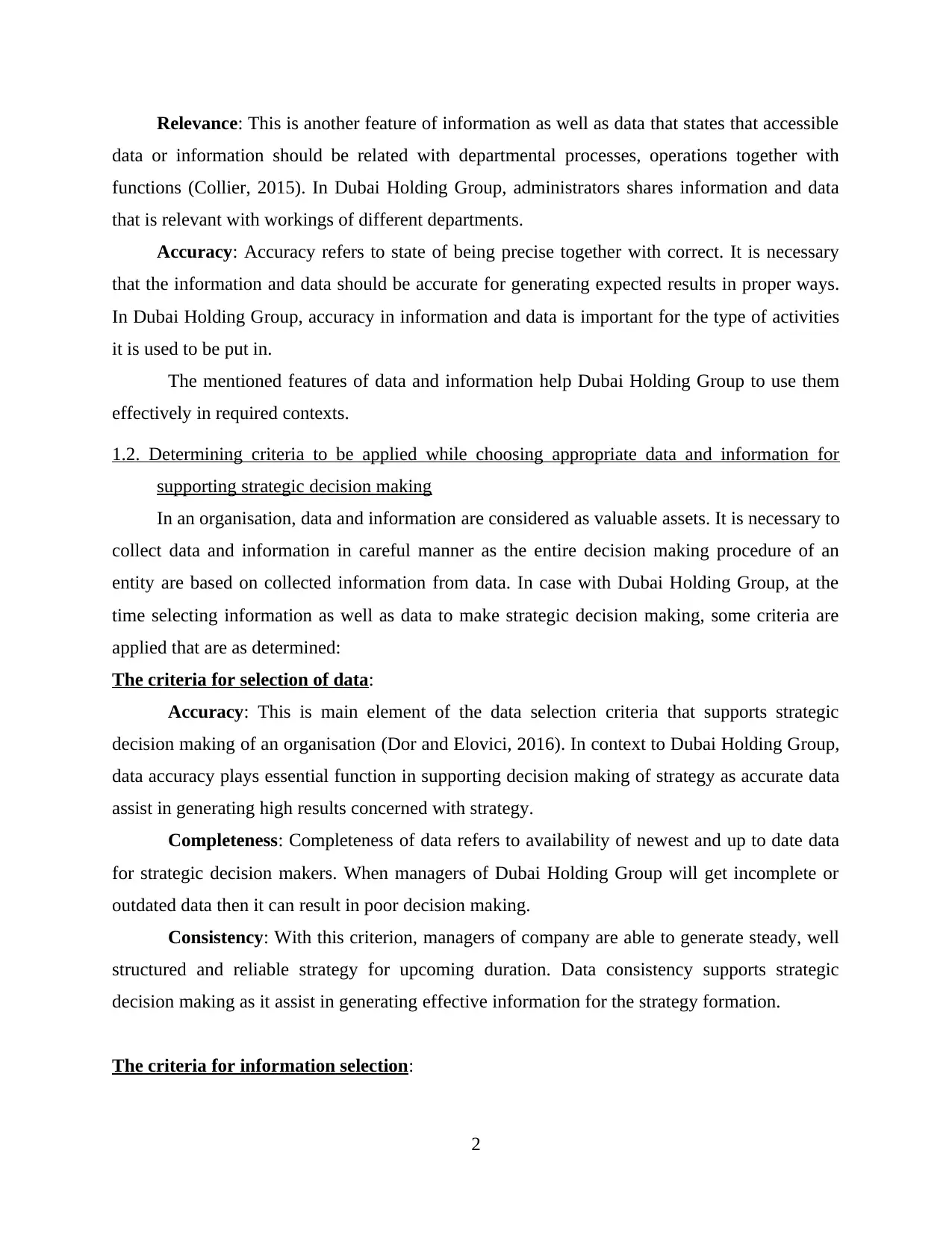
Relevance: This is another feature of information as well as data that states that accessible
data or information should be related with departmental processes, operations together with
functions (Collier, 2015). In Dubai Holding Group, administrators shares information and data
that is relevant with workings of different departments.
Accuracy: Accuracy refers to state of being precise together with correct. It is necessary
that the information and data should be accurate for generating expected results in proper ways.
In Dubai Holding Group, accuracy in information and data is important for the type of activities
it is used to be put in.
The mentioned features of data and information help Dubai Holding Group to use them
effectively in required contexts.
1.2. Determining criteria to be applied while choosing appropriate data and information for
supporting strategic decision making
In an organisation, data and information are considered as valuable assets. It is necessary to
collect data and information in careful manner as the entire decision making procedure of an
entity are based on collected information from data. In case with Dubai Holding Group, at the
time selecting information as well as data to make strategic decision making, some criteria are
applied that are as determined:
The criteria for selection of data:
Accuracy: This is main element of the data selection criteria that supports strategic
decision making of an organisation (Dor and Elovici, 2016). In context to Dubai Holding Group,
data accuracy plays essential function in supporting decision making of strategy as accurate data
assist in generating high results concerned with strategy.
Completeness: Completeness of data refers to availability of newest and up to date data
for strategic decision makers. When managers of Dubai Holding Group will get incomplete or
outdated data then it can result in poor decision making.
Consistency: With this criterion, managers of company are able to generate steady, well
structured and reliable strategy for upcoming duration. Data consistency supports strategic
decision making as it assist in generating effective information for the strategy formation.
The criteria for information selection:
2
data or information should be related with departmental processes, operations together with
functions (Collier, 2015). In Dubai Holding Group, administrators shares information and data
that is relevant with workings of different departments.
Accuracy: Accuracy refers to state of being precise together with correct. It is necessary
that the information and data should be accurate for generating expected results in proper ways.
In Dubai Holding Group, accuracy in information and data is important for the type of activities
it is used to be put in.
The mentioned features of data and information help Dubai Holding Group to use them
effectively in required contexts.
1.2. Determining criteria to be applied while choosing appropriate data and information for
supporting strategic decision making
In an organisation, data and information are considered as valuable assets. It is necessary to
collect data and information in careful manner as the entire decision making procedure of an
entity are based on collected information from data. In case with Dubai Holding Group, at the
time selecting information as well as data to make strategic decision making, some criteria are
applied that are as determined:
The criteria for selection of data:
Accuracy: This is main element of the data selection criteria that supports strategic
decision making of an organisation (Dor and Elovici, 2016). In context to Dubai Holding Group,
data accuracy plays essential function in supporting decision making of strategy as accurate data
assist in generating high results concerned with strategy.
Completeness: Completeness of data refers to availability of newest and up to date data
for strategic decision makers. When managers of Dubai Holding Group will get incomplete or
outdated data then it can result in poor decision making.
Consistency: With this criterion, managers of company are able to generate steady, well
structured and reliable strategy for upcoming duration. Data consistency supports strategic
decision making as it assist in generating effective information for the strategy formation.
The criteria for information selection:
2
Paraphrase This Document
Need a fresh take? Get an instant paraphrase of this document with our AI Paraphraser
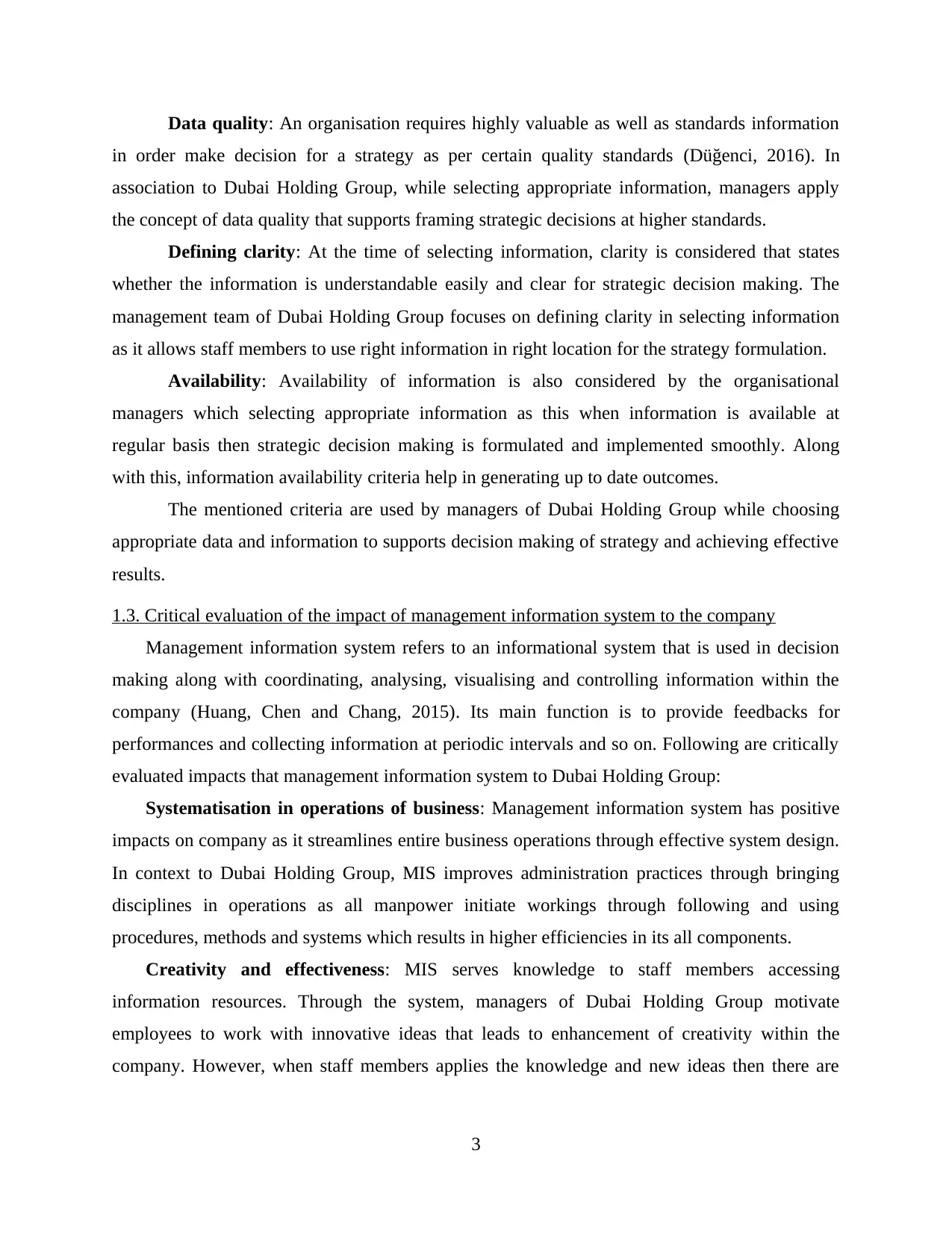
Data quality: An organisation requires highly valuable as well as standards information
in order make decision for a strategy as per certain quality standards (Düğenci, 2016). In
association to Dubai Holding Group, while selecting appropriate information, managers apply
the concept of data quality that supports framing strategic decisions at higher standards.
Defining clarity: At the time of selecting information, clarity is considered that states
whether the information is understandable easily and clear for strategic decision making. The
management team of Dubai Holding Group focuses on defining clarity in selecting information
as it allows staff members to use right information in right location for the strategy formulation.
Availability: Availability of information is also considered by the organisational
managers which selecting appropriate information as this when information is available at
regular basis then strategic decision making is formulated and implemented smoothly. Along
with this, information availability criteria help in generating up to date outcomes.
The mentioned criteria are used by managers of Dubai Holding Group while choosing
appropriate data and information to supports decision making of strategy and achieving effective
results.
1.3. Critical evaluation of the impact of management information system to the company
Management information system refers to an informational system that is used in decision
making along with coordinating, analysing, visualising and controlling information within the
company (Huang, Chen and Chang, 2015). Its main function is to provide feedbacks for
performances and collecting information at periodic intervals and so on. Following are critically
evaluated impacts that management information system to Dubai Holding Group:
Systematisation in operations of business: Management information system has positive
impacts on company as it streamlines entire business operations through effective system design.
In context to Dubai Holding Group, MIS improves administration practices through bringing
disciplines in operations as all manpower initiate workings through following and using
procedures, methods and systems which results in higher efficiencies in its all components.
Creativity and effectiveness: MIS serves knowledge to staff members accessing
information resources. Through the system, managers of Dubai Holding Group motivate
employees to work with innovative ideas that leads to enhancement of creativity within the
company. However, when staff members applies the knowledge and new ideas then there are
3
in order make decision for a strategy as per certain quality standards (Düğenci, 2016). In
association to Dubai Holding Group, while selecting appropriate information, managers apply
the concept of data quality that supports framing strategic decisions at higher standards.
Defining clarity: At the time of selecting information, clarity is considered that states
whether the information is understandable easily and clear for strategic decision making. The
management team of Dubai Holding Group focuses on defining clarity in selecting information
as it allows staff members to use right information in right location for the strategy formulation.
Availability: Availability of information is also considered by the organisational
managers which selecting appropriate information as this when information is available at
regular basis then strategic decision making is formulated and implemented smoothly. Along
with this, information availability criteria help in generating up to date outcomes.
The mentioned criteria are used by managers of Dubai Holding Group while choosing
appropriate data and information to supports decision making of strategy and achieving effective
results.
1.3. Critical evaluation of the impact of management information system to the company
Management information system refers to an informational system that is used in decision
making along with coordinating, analysing, visualising and controlling information within the
company (Huang, Chen and Chang, 2015). Its main function is to provide feedbacks for
performances and collecting information at periodic intervals and so on. Following are critically
evaluated impacts that management information system to Dubai Holding Group:
Systematisation in operations of business: Management information system has positive
impacts on company as it streamlines entire business operations through effective system design.
In context to Dubai Holding Group, MIS improves administration practices through bringing
disciplines in operations as all manpower initiate workings through following and using
procedures, methods and systems which results in higher efficiencies in its all components.
Creativity and effectiveness: MIS serves knowledge to staff members accessing
information resources. Through the system, managers of Dubai Holding Group motivate
employees to work with innovative ideas that leads to enhancement of creativity within the
company. However, when staff members applies the knowledge and new ideas then there are
3
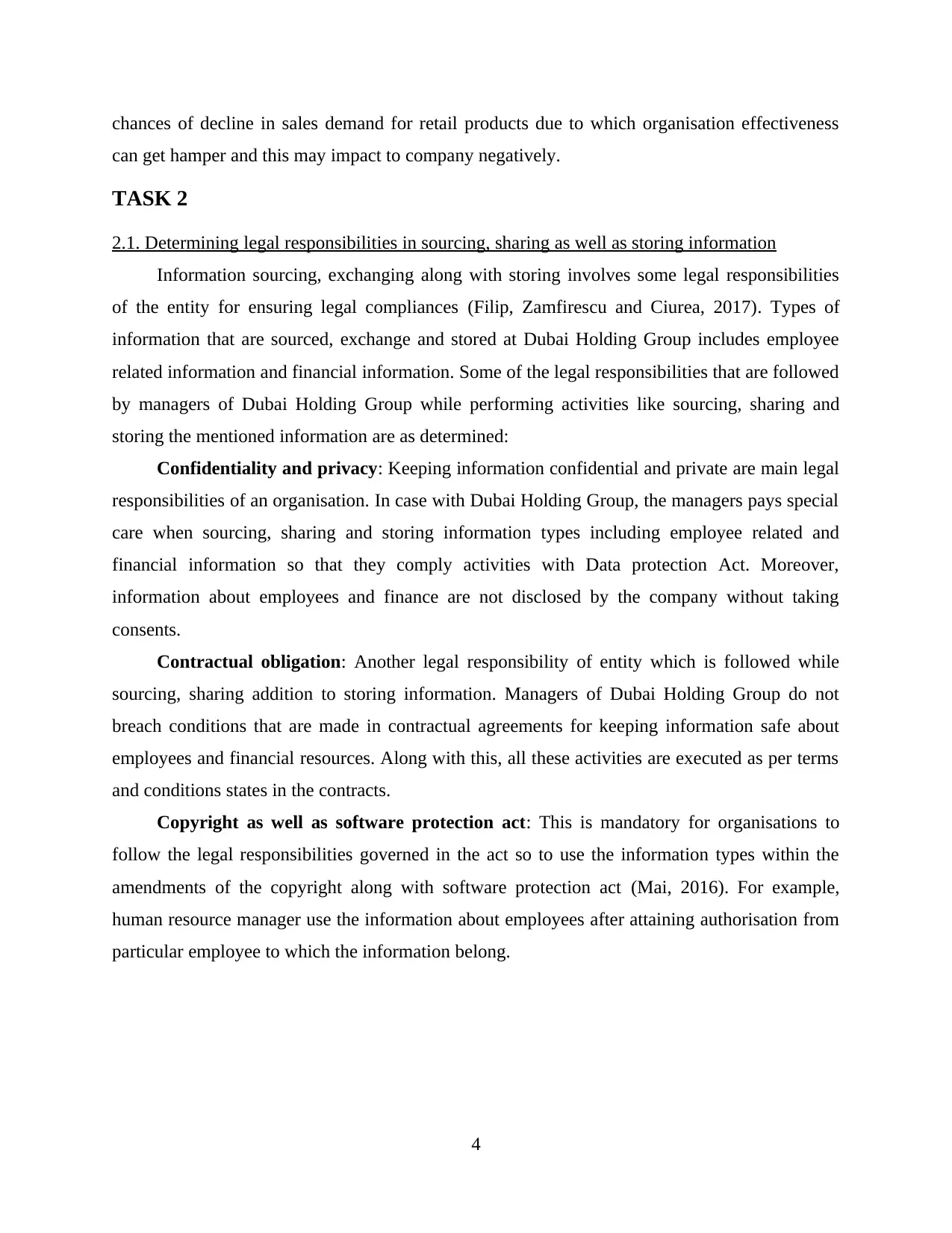
chances of decline in sales demand for retail products due to which organisation effectiveness
can get hamper and this may impact to company negatively.
TASK 2
2.1. Determining legal responsibilities in sourcing, sharing as well as storing information
Information sourcing, exchanging along with storing involves some legal responsibilities
of the entity for ensuring legal compliances (Filip, Zamfirescu and Ciurea, 2017). Types of
information that are sourced, exchange and stored at Dubai Holding Group includes employee
related information and financial information. Some of the legal responsibilities that are followed
by managers of Dubai Holding Group while performing activities like sourcing, sharing and
storing the mentioned information are as determined:
Confidentiality and privacy: Keeping information confidential and private are main legal
responsibilities of an organisation. In case with Dubai Holding Group, the managers pays special
care when sourcing, sharing and storing information types including employee related and
financial information so that they comply activities with Data protection Act. Moreover,
information about employees and finance are not disclosed by the company without taking
consents.
Contractual obligation: Another legal responsibility of entity which is followed while
sourcing, sharing addition to storing information. Managers of Dubai Holding Group do not
breach conditions that are made in contractual agreements for keeping information safe about
employees and financial resources. Along with this, all these activities are executed as per terms
and conditions states in the contracts.
Copyright as well as software protection act: This is mandatory for organisations to
follow the legal responsibilities governed in the act so to use the information types within the
amendments of the copyright along with software protection act (Mai, 2016). For example,
human resource manager use the information about employees after attaining authorisation from
particular employee to which the information belong.
4
can get hamper and this may impact to company negatively.
TASK 2
2.1. Determining legal responsibilities in sourcing, sharing as well as storing information
Information sourcing, exchanging along with storing involves some legal responsibilities
of the entity for ensuring legal compliances (Filip, Zamfirescu and Ciurea, 2017). Types of
information that are sourced, exchange and stored at Dubai Holding Group includes employee
related information and financial information. Some of the legal responsibilities that are followed
by managers of Dubai Holding Group while performing activities like sourcing, sharing and
storing the mentioned information are as determined:
Confidentiality and privacy: Keeping information confidential and private are main legal
responsibilities of an organisation. In case with Dubai Holding Group, the managers pays special
care when sourcing, sharing and storing information types including employee related and
financial information so that they comply activities with Data protection Act. Moreover,
information about employees and finance are not disclosed by the company without taking
consents.
Contractual obligation: Another legal responsibility of entity which is followed while
sourcing, sharing addition to storing information. Managers of Dubai Holding Group do not
breach conditions that are made in contractual agreements for keeping information safe about
employees and financial resources. Along with this, all these activities are executed as per terms
and conditions states in the contracts.
Copyright as well as software protection act: This is mandatory for organisations to
follow the legal responsibilities governed in the act so to use the information types within the
amendments of the copyright along with software protection act (Mai, 2016). For example,
human resource manager use the information about employees after attaining authorisation from
particular employee to which the information belong.
4
⊘ This is a preview!⊘
Do you want full access?
Subscribe today to unlock all pages.

Trusted by 1+ million students worldwide
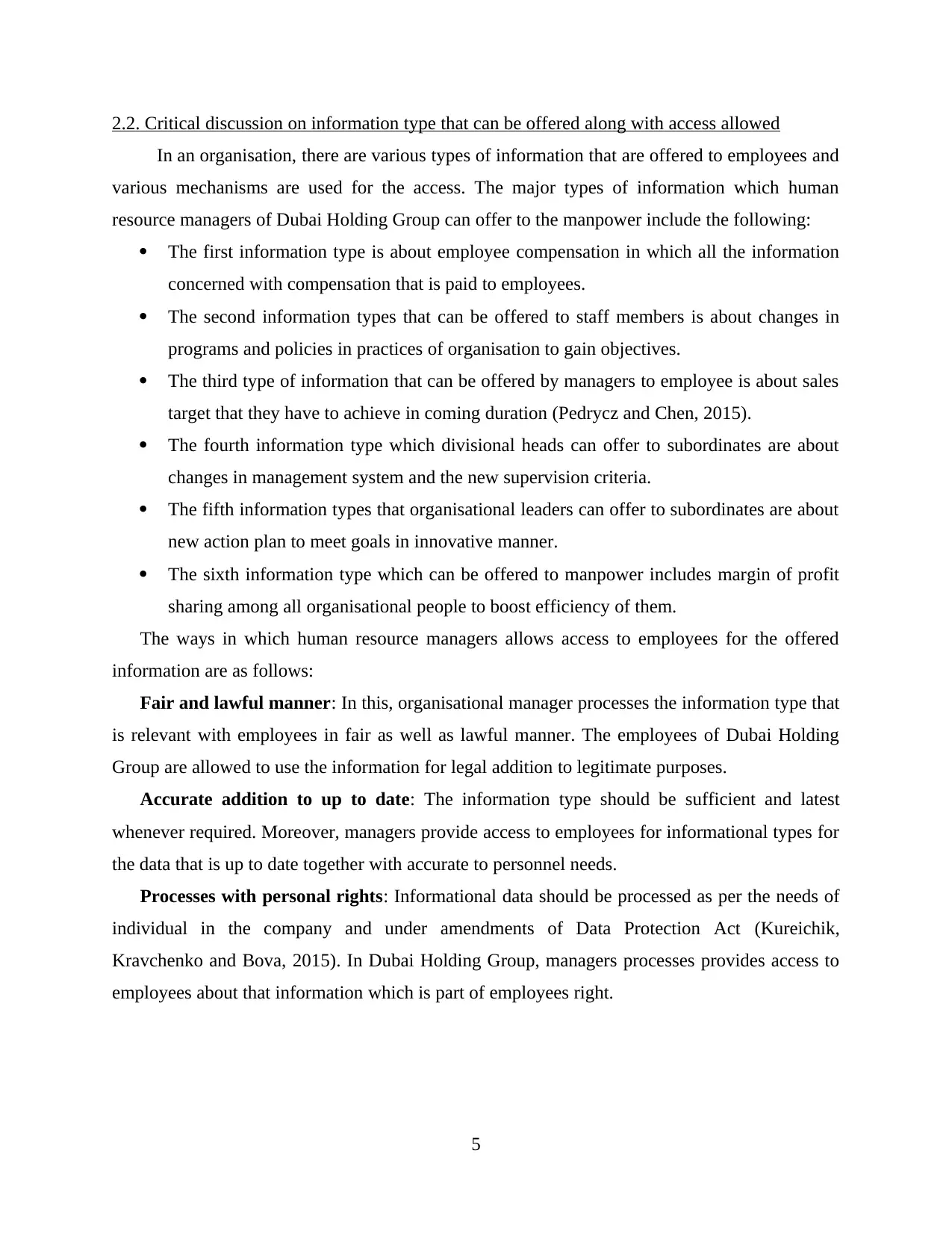
2.2. Critical discussion on information type that can be offered along with access allowed
In an organisation, there are various types of information that are offered to employees and
various mechanisms are used for the access. The major types of information which human
resource managers of Dubai Holding Group can offer to the manpower include the following:
The first information type is about employee compensation in which all the information
concerned with compensation that is paid to employees.
The second information types that can be offered to staff members is about changes in
programs and policies in practices of organisation to gain objectives.
The third type of information that can be offered by managers to employee is about sales
target that they have to achieve in coming duration (Pedrycz and Chen, 2015).
The fourth information type which divisional heads can offer to subordinates are about
changes in management system and the new supervision criteria.
The fifth information types that organisational leaders can offer to subordinates are about
new action plan to meet goals in innovative manner.
The sixth information type which can be offered to manpower includes margin of profit
sharing among all organisational people to boost efficiency of them.
The ways in which human resource managers allows access to employees for the offered
information are as follows:
Fair and lawful manner: In this, organisational manager processes the information type that
is relevant with employees in fair as well as lawful manner. The employees of Dubai Holding
Group are allowed to use the information for legal addition to legitimate purposes.
Accurate addition to up to date: The information type should be sufficient and latest
whenever required. Moreover, managers provide access to employees for informational types for
the data that is up to date together with accurate to personnel needs.
Processes with personal rights: Informational data should be processed as per the needs of
individual in the company and under amendments of Data Protection Act (Kureichik,
Kravchenko and Bova, 2015). In Dubai Holding Group, managers processes provides access to
employees about that information which is part of employees right.
5
In an organisation, there are various types of information that are offered to employees and
various mechanisms are used for the access. The major types of information which human
resource managers of Dubai Holding Group can offer to the manpower include the following:
The first information type is about employee compensation in which all the information
concerned with compensation that is paid to employees.
The second information types that can be offered to staff members is about changes in
programs and policies in practices of organisation to gain objectives.
The third type of information that can be offered by managers to employee is about sales
target that they have to achieve in coming duration (Pedrycz and Chen, 2015).
The fourth information type which divisional heads can offer to subordinates are about
changes in management system and the new supervision criteria.
The fifth information types that organisational leaders can offer to subordinates are about
new action plan to meet goals in innovative manner.
The sixth information type which can be offered to manpower includes margin of profit
sharing among all organisational people to boost efficiency of them.
The ways in which human resource managers allows access to employees for the offered
information are as follows:
Fair and lawful manner: In this, organisational manager processes the information type that
is relevant with employees in fair as well as lawful manner. The employees of Dubai Holding
Group are allowed to use the information for legal addition to legitimate purposes.
Accurate addition to up to date: The information type should be sufficient and latest
whenever required. Moreover, managers provide access to employees for informational types for
the data that is up to date together with accurate to personnel needs.
Processes with personal rights: Informational data should be processed as per the needs of
individual in the company and under amendments of Data Protection Act (Kureichik,
Kravchenko and Bova, 2015). In Dubai Holding Group, managers processes provides access to
employees about that information which is part of employees right.
5
Paraphrase This Document
Need a fresh take? Get an instant paraphrase of this document with our AI Paraphraser
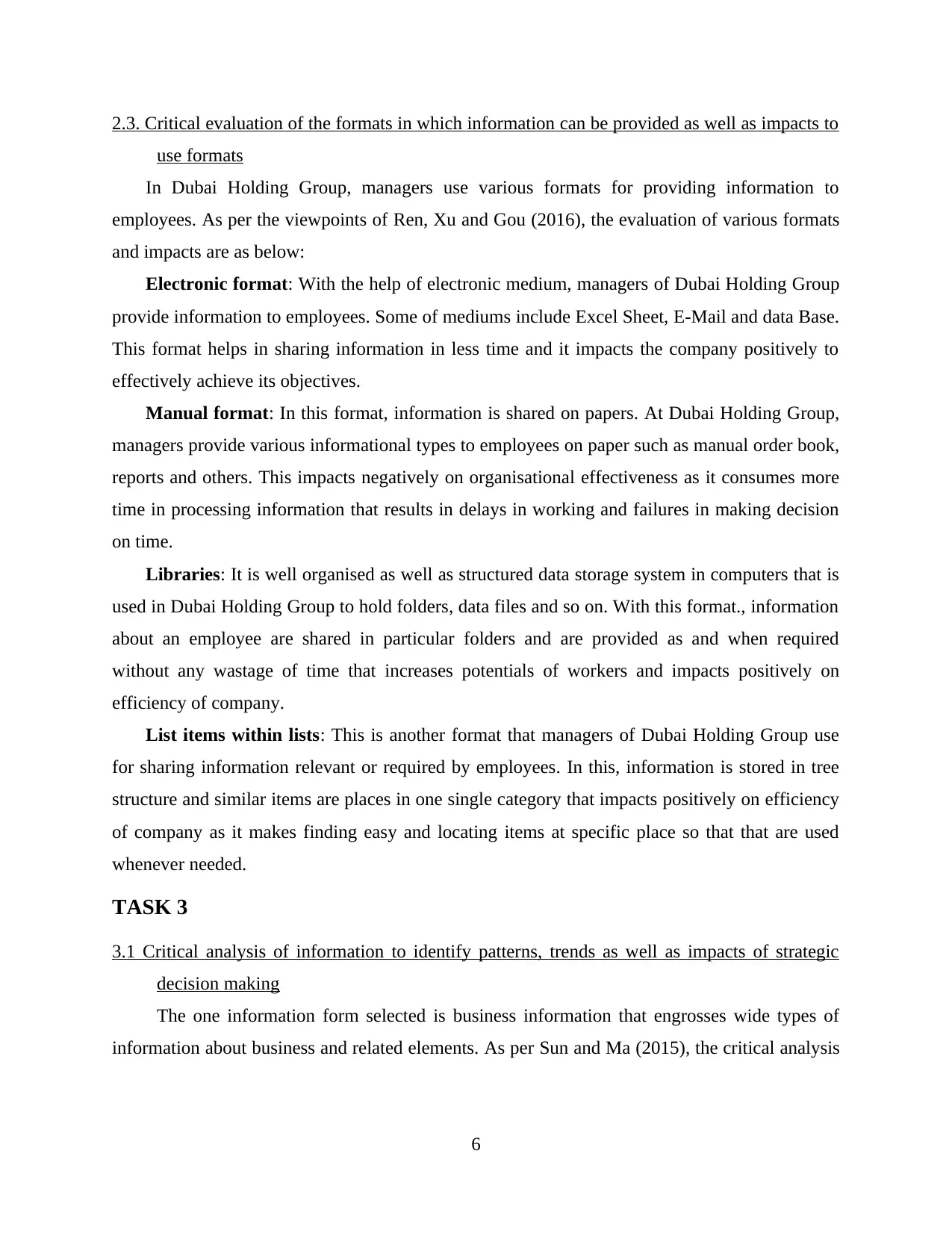
2.3. Critical evaluation of the formats in which information can be provided as well as impacts to
use formats
In Dubai Holding Group, managers use various formats for providing information to
employees. As per the viewpoints of Ren, Xu and Gou (2016), the evaluation of various formats
and impacts are as below:
Electronic format: With the help of electronic medium, managers of Dubai Holding Group
provide information to employees. Some of mediums include Excel Sheet, E-Mail and data Base.
This format helps in sharing information in less time and it impacts the company positively to
effectively achieve its objectives.
Manual format: In this format, information is shared on papers. At Dubai Holding Group,
managers provide various informational types to employees on paper such as manual order book,
reports and others. This impacts negatively on organisational effectiveness as it consumes more
time in processing information that results in delays in working and failures in making decision
on time.
Libraries: It is well organised as well as structured data storage system in computers that is
used in Dubai Holding Group to hold folders, data files and so on. With this format., information
about an employee are shared in particular folders and are provided as and when required
without any wastage of time that increases potentials of workers and impacts positively on
efficiency of company.
List items within lists: This is another format that managers of Dubai Holding Group use
for sharing information relevant or required by employees. In this, information is stored in tree
structure and similar items are places in one single category that impacts positively on efficiency
of company as it makes finding easy and locating items at specific place so that that are used
whenever needed.
TASK 3
3.1 Critical analysis of information to identify patterns, trends as well as impacts of strategic
decision making
The one information form selected is business information that engrosses wide types of
information about business and related elements. As per Sun and Ma (2015), the critical analysis
6
use formats
In Dubai Holding Group, managers use various formats for providing information to
employees. As per the viewpoints of Ren, Xu and Gou (2016), the evaluation of various formats
and impacts are as below:
Electronic format: With the help of electronic medium, managers of Dubai Holding Group
provide information to employees. Some of mediums include Excel Sheet, E-Mail and data Base.
This format helps in sharing information in less time and it impacts the company positively to
effectively achieve its objectives.
Manual format: In this format, information is shared on papers. At Dubai Holding Group,
managers provide various informational types to employees on paper such as manual order book,
reports and others. This impacts negatively on organisational effectiveness as it consumes more
time in processing information that results in delays in working and failures in making decision
on time.
Libraries: It is well organised as well as structured data storage system in computers that is
used in Dubai Holding Group to hold folders, data files and so on. With this format., information
about an employee are shared in particular folders and are provided as and when required
without any wastage of time that increases potentials of workers and impacts positively on
efficiency of company.
List items within lists: This is another format that managers of Dubai Holding Group use
for sharing information relevant or required by employees. In this, information is stored in tree
structure and similar items are places in one single category that impacts positively on efficiency
of company as it makes finding easy and locating items at specific place so that that are used
whenever needed.
TASK 3
3.1 Critical analysis of information to identify patterns, trends as well as impacts of strategic
decision making
The one information form selected is business information that engrosses wide types of
information about business and related elements. As per Sun and Ma (2015), the critical analysis
6
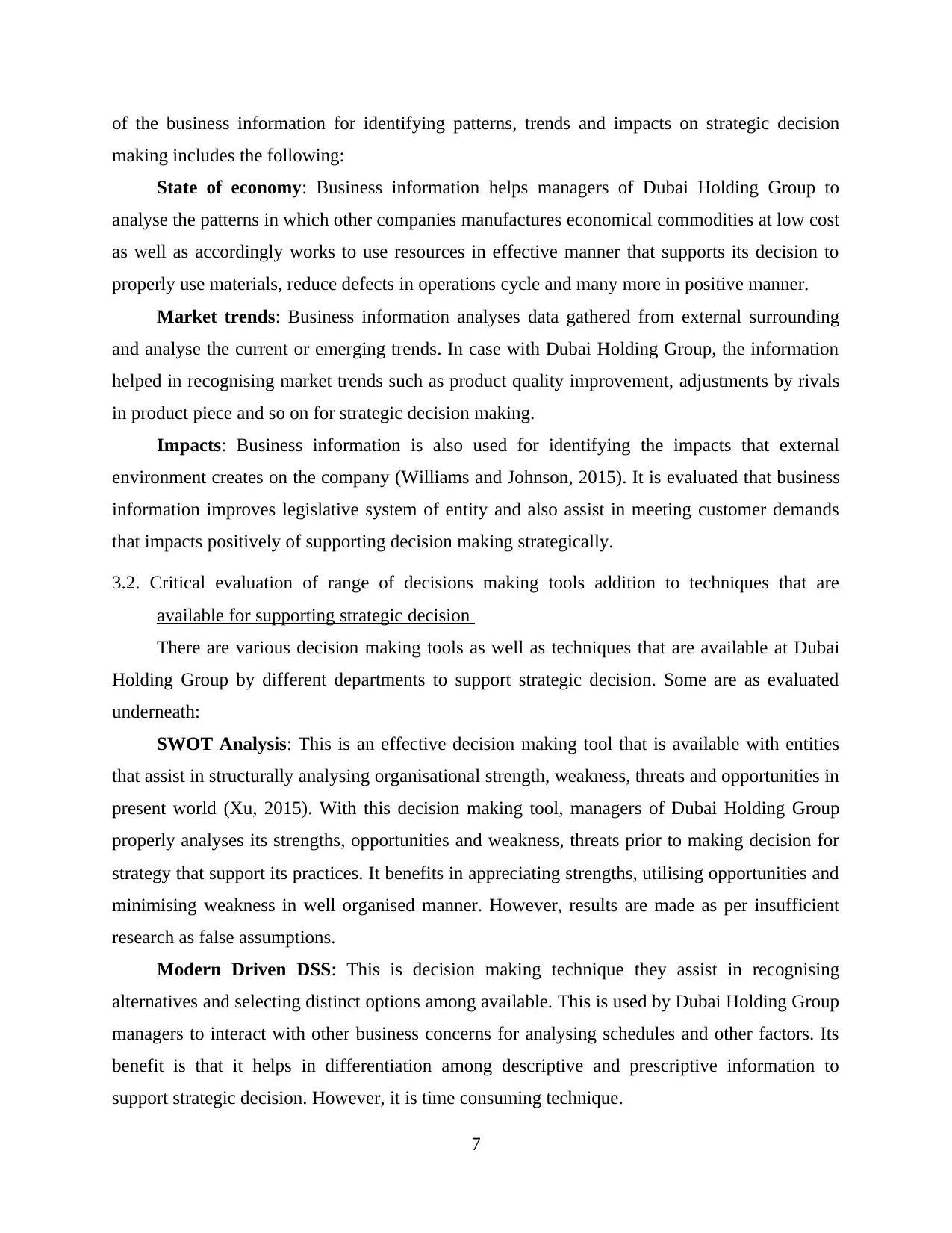
of the business information for identifying patterns, trends and impacts on strategic decision
making includes the following:
State of economy: Business information helps managers of Dubai Holding Group to
analyse the patterns in which other companies manufactures economical commodities at low cost
as well as accordingly works to use resources in effective manner that supports its decision to
properly use materials, reduce defects in operations cycle and many more in positive manner.
Market trends: Business information analyses data gathered from external surrounding
and analyse the current or emerging trends. In case with Dubai Holding Group, the information
helped in recognising market trends such as product quality improvement, adjustments by rivals
in product piece and so on for strategic decision making.
Impacts: Business information is also used for identifying the impacts that external
environment creates on the company (Williams and Johnson, 2015). It is evaluated that business
information improves legislative system of entity and also assist in meeting customer demands
that impacts positively of supporting decision making strategically.
3.2. Critical evaluation of range of decisions making tools addition to techniques that are
available for supporting strategic decision
There are various decision making tools as well as techniques that are available at Dubai
Holding Group by different departments to support strategic decision. Some are as evaluated
underneath:
SWOT Analysis: This is an effective decision making tool that is available with entities
that assist in structurally analysing organisational strength, weakness, threats and opportunities in
present world (Xu, 2015). With this decision making tool, managers of Dubai Holding Group
properly analyses its strengths, opportunities and weakness, threats prior to making decision for
strategy that support its practices. It benefits in appreciating strengths, utilising opportunities and
minimising weakness in well organised manner. However, results are made as per insufficient
research as false assumptions.
Modern Driven DSS: This is decision making technique they assist in recognising
alternatives and selecting distinct options among available. This is used by Dubai Holding Group
managers to interact with other business concerns for analysing schedules and other factors. Its
benefit is that it helps in differentiation among descriptive and prescriptive information to
support strategic decision. However, it is time consuming technique.
7
making includes the following:
State of economy: Business information helps managers of Dubai Holding Group to
analyse the patterns in which other companies manufactures economical commodities at low cost
as well as accordingly works to use resources in effective manner that supports its decision to
properly use materials, reduce defects in operations cycle and many more in positive manner.
Market trends: Business information analyses data gathered from external surrounding
and analyse the current or emerging trends. In case with Dubai Holding Group, the information
helped in recognising market trends such as product quality improvement, adjustments by rivals
in product piece and so on for strategic decision making.
Impacts: Business information is also used for identifying the impacts that external
environment creates on the company (Williams and Johnson, 2015). It is evaluated that business
information improves legislative system of entity and also assist in meeting customer demands
that impacts positively of supporting decision making strategically.
3.2. Critical evaluation of range of decisions making tools addition to techniques that are
available for supporting strategic decision
There are various decision making tools as well as techniques that are available at Dubai
Holding Group by different departments to support strategic decision. Some are as evaluated
underneath:
SWOT Analysis: This is an effective decision making tool that is available with entities
that assist in structurally analysing organisational strength, weakness, threats and opportunities in
present world (Xu, 2015). With this decision making tool, managers of Dubai Holding Group
properly analyses its strengths, opportunities and weakness, threats prior to making decision for
strategy that support its practices. It benefits in appreciating strengths, utilising opportunities and
minimising weakness in well organised manner. However, results are made as per insufficient
research as false assumptions.
Modern Driven DSS: This is decision making technique they assist in recognising
alternatives and selecting distinct options among available. This is used by Dubai Holding Group
managers to interact with other business concerns for analysing schedules and other factors. Its
benefit is that it helps in differentiation among descriptive and prescriptive information to
support strategic decision. However, it is time consuming technique.
7
⊘ This is a preview!⊘
Do you want full access?
Subscribe today to unlock all pages.

Trusted by 1+ million students worldwide
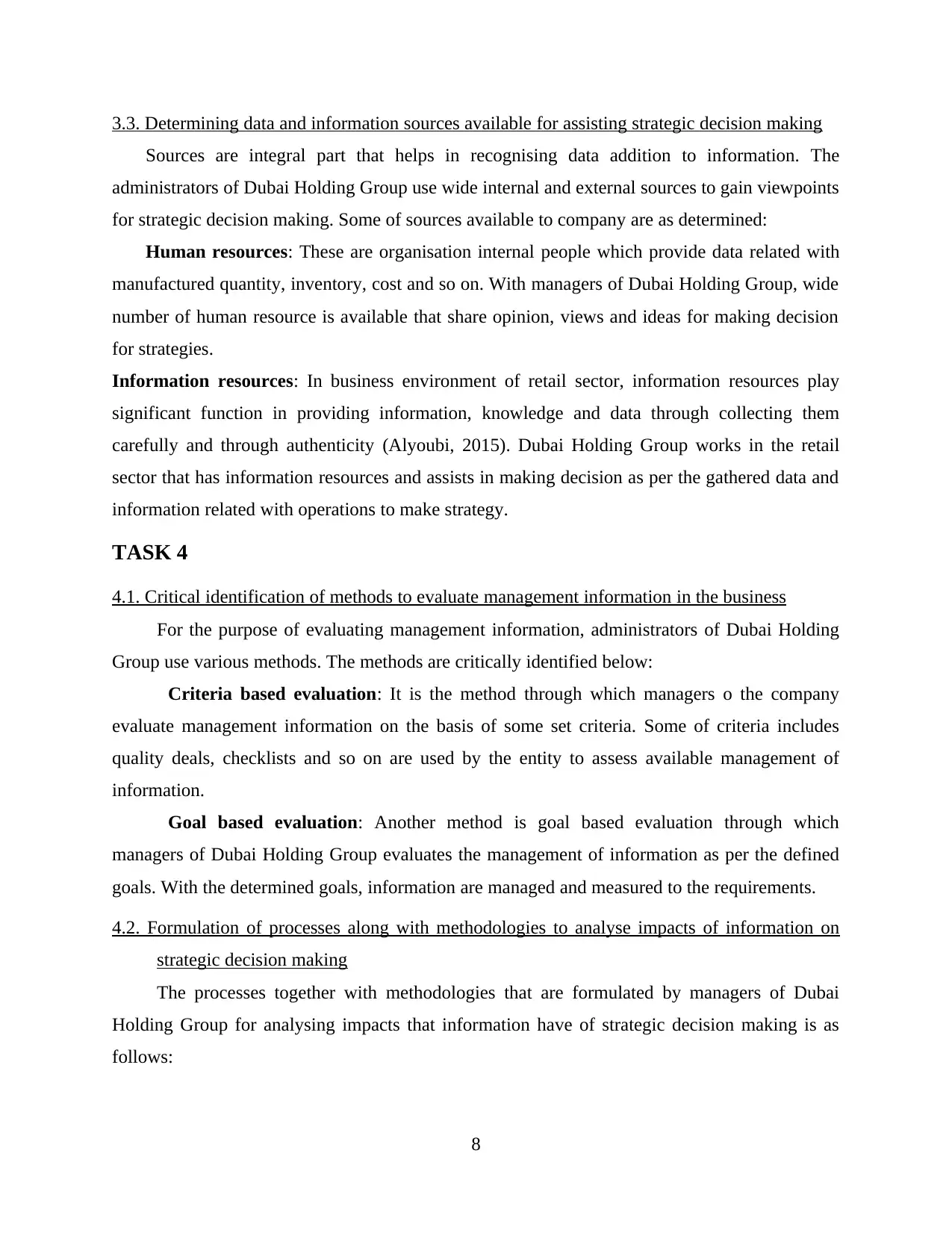
3.3. Determining data and information sources available for assisting strategic decision making
Sources are integral part that helps in recognising data addition to information. The
administrators of Dubai Holding Group use wide internal and external sources to gain viewpoints
for strategic decision making. Some of sources available to company are as determined:
Human resources: These are organisation internal people which provide data related with
manufactured quantity, inventory, cost and so on. With managers of Dubai Holding Group, wide
number of human resource is available that share opinion, views and ideas for making decision
for strategies.
Information resources: In business environment of retail sector, information resources play
significant function in providing information, knowledge and data through collecting them
carefully and through authenticity (Alyoubi, 2015). Dubai Holding Group works in the retail
sector that has information resources and assists in making decision as per the gathered data and
information related with operations to make strategy.
TASK 4
4.1. Critical identification of methods to evaluate management information in the business
For the purpose of evaluating management information, administrators of Dubai Holding
Group use various methods. The methods are critically identified below:
Criteria based evaluation: It is the method through which managers o the company
evaluate management information on the basis of some set criteria. Some of criteria includes
quality deals, checklists and so on are used by the entity to assess available management of
information.
Goal based evaluation: Another method is goal based evaluation through which
managers of Dubai Holding Group evaluates the management of information as per the defined
goals. With the determined goals, information are managed and measured to the requirements.
4.2. Formulation of processes along with methodologies to analyse impacts of information on
strategic decision making
The processes together with methodologies that are formulated by managers of Dubai
Holding Group for analysing impacts that information have of strategic decision making is as
follows:
8
Sources are integral part that helps in recognising data addition to information. The
administrators of Dubai Holding Group use wide internal and external sources to gain viewpoints
for strategic decision making. Some of sources available to company are as determined:
Human resources: These are organisation internal people which provide data related with
manufactured quantity, inventory, cost and so on. With managers of Dubai Holding Group, wide
number of human resource is available that share opinion, views and ideas for making decision
for strategies.
Information resources: In business environment of retail sector, information resources play
significant function in providing information, knowledge and data through collecting them
carefully and through authenticity (Alyoubi, 2015). Dubai Holding Group works in the retail
sector that has information resources and assists in making decision as per the gathered data and
information related with operations to make strategy.
TASK 4
4.1. Critical identification of methods to evaluate management information in the business
For the purpose of evaluating management information, administrators of Dubai Holding
Group use various methods. The methods are critically identified below:
Criteria based evaluation: It is the method through which managers o the company
evaluate management information on the basis of some set criteria. Some of criteria includes
quality deals, checklists and so on are used by the entity to assess available management of
information.
Goal based evaluation: Another method is goal based evaluation through which
managers of Dubai Holding Group evaluates the management of information as per the defined
goals. With the determined goals, information are managed and measured to the requirements.
4.2. Formulation of processes along with methodologies to analyse impacts of information on
strategic decision making
The processes together with methodologies that are formulated by managers of Dubai
Holding Group for analysing impacts that information have of strategic decision making is as
follows:
8
Paraphrase This Document
Need a fresh take? Get an instant paraphrase of this document with our AI Paraphraser
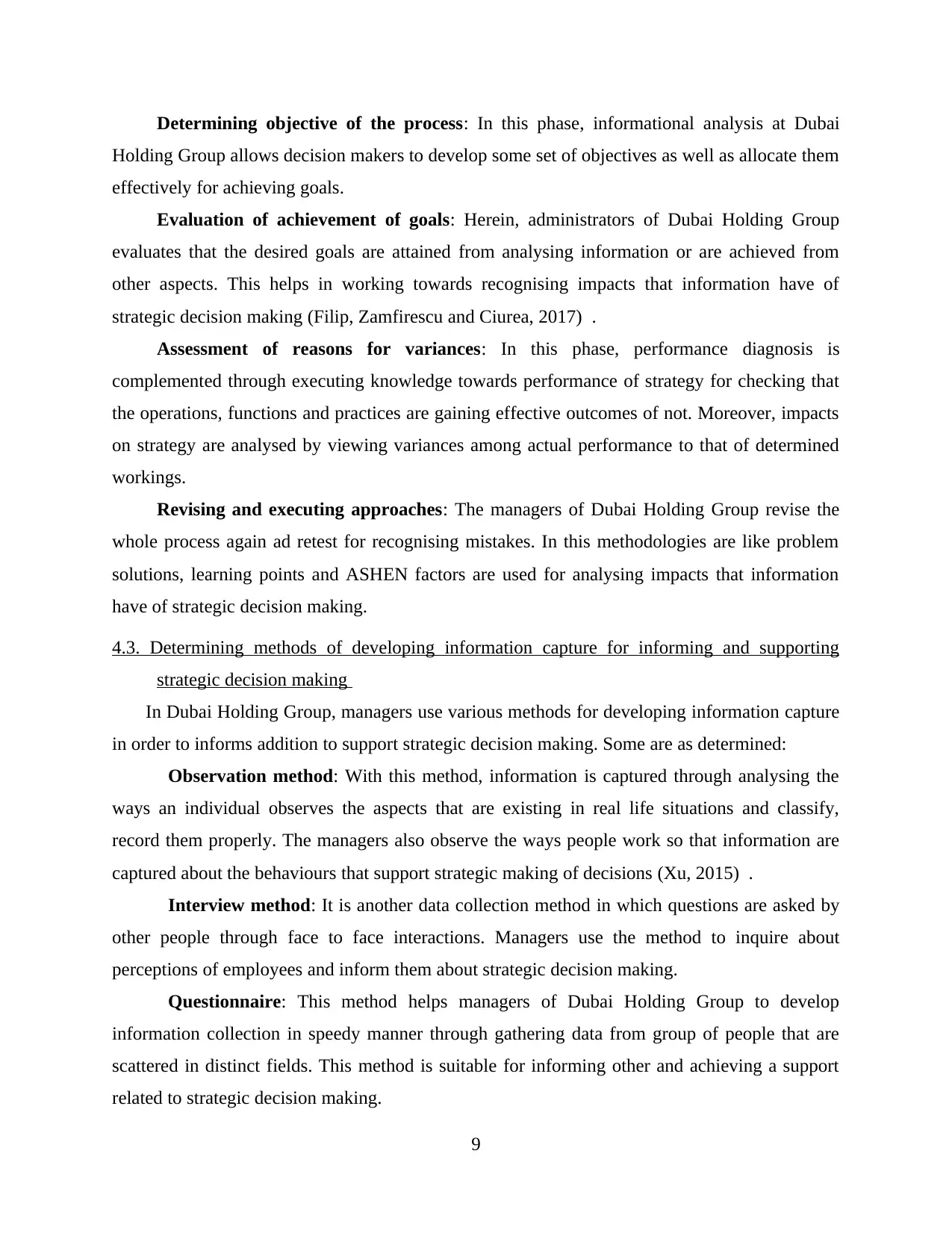
Determining objective of the process: In this phase, informational analysis at Dubai
Holding Group allows decision makers to develop some set of objectives as well as allocate them
effectively for achieving goals.
Evaluation of achievement of goals: Herein, administrators of Dubai Holding Group
evaluates that the desired goals are attained from analysing information or are achieved from
other aspects. This helps in working towards recognising impacts that information have of
strategic decision making (Filip, Zamfirescu and Ciurea, 2017) .
Assessment of reasons for variances: In this phase, performance diagnosis is
complemented through executing knowledge towards performance of strategy for checking that
the operations, functions and practices are gaining effective outcomes of not. Moreover, impacts
on strategy are analysed by viewing variances among actual performance to that of determined
workings.
Revising and executing approaches: The managers of Dubai Holding Group revise the
whole process again ad retest for recognising mistakes. In this methodologies are like problem
solutions, learning points and ASHEN factors are used for analysing impacts that information
have of strategic decision making.
4.3. Determining methods of developing information capture for informing and supporting
strategic decision making
In Dubai Holding Group, managers use various methods for developing information capture
in order to informs addition to support strategic decision making. Some are as determined:
Observation method: With this method, information is captured through analysing the
ways an individual observes the aspects that are existing in real life situations and classify,
record them properly. The managers also observe the ways people work so that information are
captured about the behaviours that support strategic making of decisions (Xu, 2015) .
Interview method: It is another data collection method in which questions are asked by
other people through face to face interactions. Managers use the method to inquire about
perceptions of employees and inform them about strategic decision making.
Questionnaire: This method helps managers of Dubai Holding Group to develop
information collection in speedy manner through gathering data from group of people that are
scattered in distinct fields. This method is suitable for informing other and achieving a support
related to strategic decision making.
9
Holding Group allows decision makers to develop some set of objectives as well as allocate them
effectively for achieving goals.
Evaluation of achievement of goals: Herein, administrators of Dubai Holding Group
evaluates that the desired goals are attained from analysing information or are achieved from
other aspects. This helps in working towards recognising impacts that information have of
strategic decision making (Filip, Zamfirescu and Ciurea, 2017) .
Assessment of reasons for variances: In this phase, performance diagnosis is
complemented through executing knowledge towards performance of strategy for checking that
the operations, functions and practices are gaining effective outcomes of not. Moreover, impacts
on strategy are analysed by viewing variances among actual performance to that of determined
workings.
Revising and executing approaches: The managers of Dubai Holding Group revise the
whole process again ad retest for recognising mistakes. In this methodologies are like problem
solutions, learning points and ASHEN factors are used for analysing impacts that information
have of strategic decision making.
4.3. Determining methods of developing information capture for informing and supporting
strategic decision making
In Dubai Holding Group, managers use various methods for developing information capture
in order to informs addition to support strategic decision making. Some are as determined:
Observation method: With this method, information is captured through analysing the
ways an individual observes the aspects that are existing in real life situations and classify,
record them properly. The managers also observe the ways people work so that information are
captured about the behaviours that support strategic making of decisions (Xu, 2015) .
Interview method: It is another data collection method in which questions are asked by
other people through face to face interactions. Managers use the method to inquire about
perceptions of employees and inform them about strategic decision making.
Questionnaire: This method helps managers of Dubai Holding Group to develop
information collection in speedy manner through gathering data from group of people that are
scattered in distinct fields. This method is suitable for informing other and achieving a support
related to strategic decision making.
9
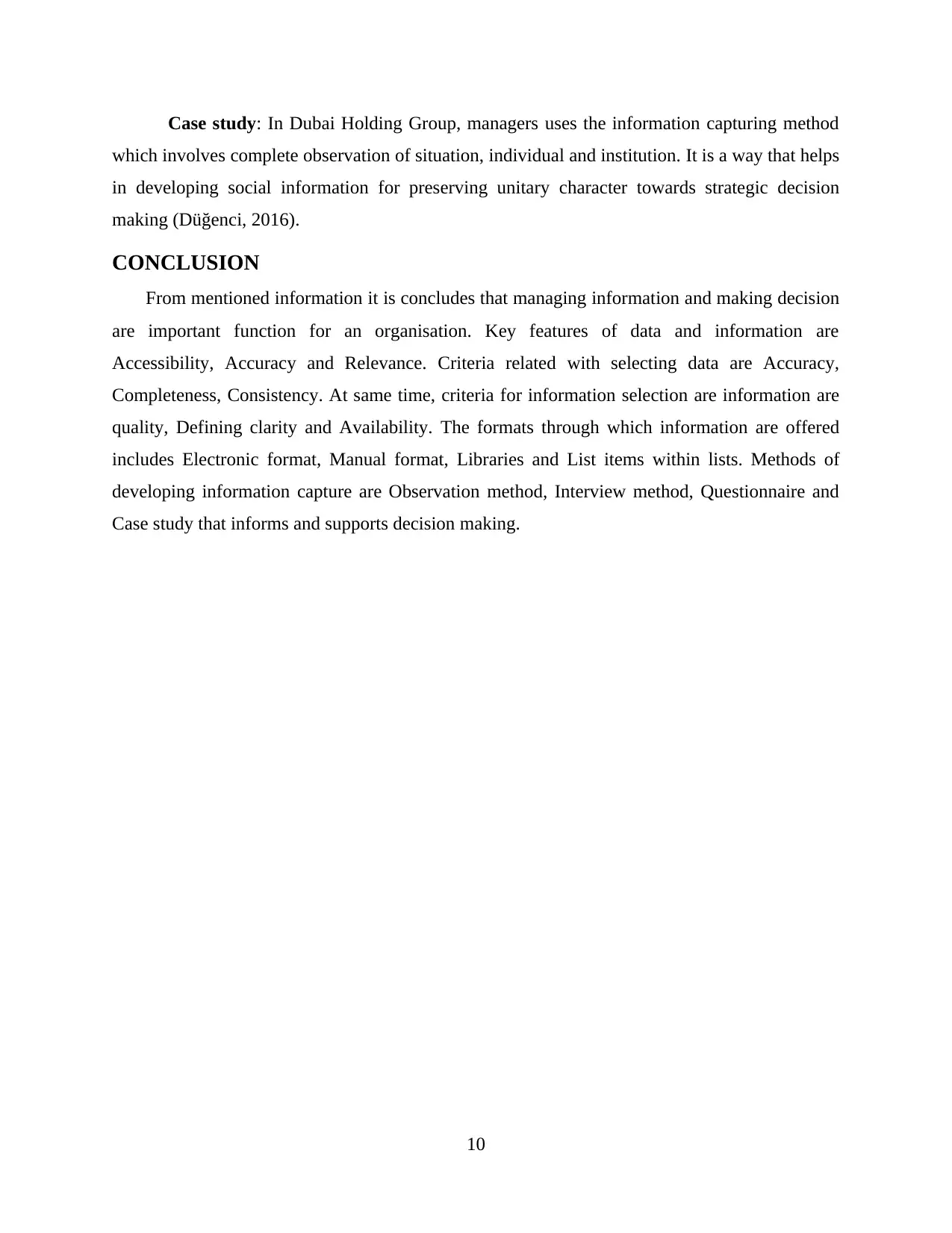
Case study: In Dubai Holding Group, managers uses the information capturing method
which involves complete observation of situation, individual and institution. It is a way that helps
in developing social information for preserving unitary character towards strategic decision
making (Düğenci, 2016).
CONCLUSION
From mentioned information it is concludes that managing information and making decision
are important function for an organisation. Key features of data and information are
Accessibility, Accuracy and Relevance. Criteria related with selecting data are Accuracy,
Completeness, Consistency. At same time, criteria for information selection are information are
quality, Defining clarity and Availability. The formats through which information are offered
includes Electronic format, Manual format, Libraries and List items within lists. Methods of
developing information capture are Observation method, Interview method, Questionnaire and
Case study that informs and supports decision making.
10
which involves complete observation of situation, individual and institution. It is a way that helps
in developing social information for preserving unitary character towards strategic decision
making (Düğenci, 2016).
CONCLUSION
From mentioned information it is concludes that managing information and making decision
are important function for an organisation. Key features of data and information are
Accessibility, Accuracy and Relevance. Criteria related with selecting data are Accuracy,
Completeness, Consistency. At same time, criteria for information selection are information are
quality, Defining clarity and Availability. The formats through which information are offered
includes Electronic format, Manual format, Libraries and List items within lists. Methods of
developing information capture are Observation method, Interview method, Questionnaire and
Case study that informs and supports decision making.
10
⊘ This is a preview!⊘
Do you want full access?
Subscribe today to unlock all pages.

Trusted by 1+ million students worldwide
1 out of 13
Related Documents
Your All-in-One AI-Powered Toolkit for Academic Success.
+13062052269
info@desklib.com
Available 24*7 on WhatsApp / Email
![[object Object]](/_next/static/media/star-bottom.7253800d.svg)
Unlock your academic potential
Copyright © 2020–2026 A2Z Services. All Rights Reserved. Developed and managed by ZUCOL.





